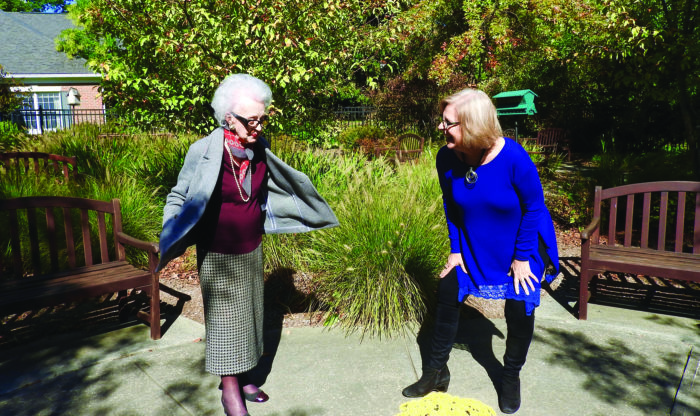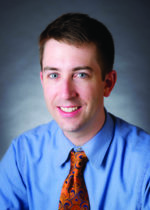
Personality changes, difficulty coordinating personal activities and juggling multiple tasks at the same time, getting lost in familiar places–the changes may be gradual when a person develops dementia. As medical professionals learn more about how dementia travels in the brain, they are better able to ascertain how that path affects someone with the disease.

PHOTO COURTESY OF COLUMBIA UNIVERSITY
Within the umbrella term of dementia, he explained, “Alzheimer’s is the most common form of dementia (other forms are Lewy Body and frontotemporal dementia). In most cases of Alzheimer’s disease, people present with primarily memory loss that may be alongside other cognitive problems.”
Maria Mursch, LMSW, a Care Consultant and Director of Family Education for the Alzheimer’s Association, Hudson Valley Chapter, clarified, “When we talk about the disease, we’re talking about memory loss and about regions of the brain that control functions, judgment, personality/behavior and insight. That’s why we see a multitude of symptoms.”
Noble cited a middle ground called mild cognitive impairment that doesn’t interfere with day-to-day life. “About 50 percent of those with Alzheimer’s are unaware they have a problem, which poses a challenge for diagnoses and delays someone going to the doctor,” he said, unless a caregiver accompanies a patient during a doctor visit.
Often families face a choice between placing their loved one(s) into a home and keeping them in their own home(s) with an aide or additional caregivers. One facility that focuses solely on caring for those with dementia is The Greens At Greenwich, the first assisted living facility in Connecticut designed for people diagnosed with dementia or memory, according to The Greens Executive Director Maria Scaros.
“All our staff is trained in dementia care and engages with residents daily,” said Scaros. Each of its 31 apartments is decorated with residents’ own furniture to give a semblance of familiarity. Outside each door is a glass-enclosed box filled with pictures, tokens and other objects that can spur recognition. “Although age is the biggest single risk factor for Alzheimer’s and other forms of dementia,” Noble explained, “dementia is not part of the normal aging process.” Genetic dementia, while uncommon, presents “in families that have onset under the age of 60, affecting half the family within a generation.”
While families may have expectations and fantasies about the loved one returning to his or her former self, “they are not expected to deal with dementia alone,” Scaros maintained. The facility embraces the entire family, removing the burden of care so they can maintain their roles as spouse, daughter, son and grandchild. “We get to know their family member in the here and now and relate to them as they are in the moment.”
Mursch agreed it’s important to meet the person where he or she is mentally and emotionally. Many patients with Alzheimer’s are first misdiagnosed with depression (the blues), Noble said. “Instead, typical mood changes in Alzheimer’s can be described as ‘get up and go got up and went.’ Addressing this loss of interest in activities can be very challenging. Families may not realize that to engage a loved one in an activity, they need to be proactive.”
A familiar setting will become unfamiliar at some point, Mursch said. “When that starts to happen, we’re looking at someone who progressed in the disease,” she said. “It is important to keep the person comfortable and socializing and active, and there are ways to accommodate the person at home.”
Alzheimer’s Association (https://www.alz.org/) offers support programs and activities and a 24-hour number (1-800-272-3900) that’s answered by the local chapter during work hours and by its national headquarters after hours. Mursch added, “There may be a point when it becomes unsafe to live at home because of the physical environment (i.e. a staircase) or when the caregiver can no longer take care of the person or the situation cannot be resolved by increasing home care.”
Scaros noted The Greens’ biggest competition is home care, which may be the best solution for some. “We need to recognize, however, that when someone says, ‘I want to go home,’ it means, ‘I want to feel safe, secure, loved and engaged.’” Home becomes a feeling rather than a place.
Social activities and cognitive stimulation like hobbies can keep the brain alert. Scaros was trained as a drama therapist and ensures that creative arts therapies are an integral part of The Green’s programs. Lynn Hagerbrant feels the facility goes well beyond the standard of care in sharing, caring and loving for her own parent living there. “They have heart and soul, a caring heartbeat that starts with Maria and flows through all her staff.”
Science continues to research cures for dementia. “New treatments may not be not that far away, and trials to date have helped foresee what next steps to take,” Noble said. For information, visit www.cumc.columbia.edu/dept/taub.
